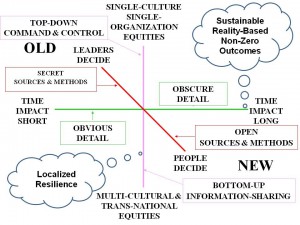
More People Were Paid To Exploit Heartbleed For The NSA Than To Fix It
Infrastructure – Zacqary Adam Green: Unsurprisingly, it turns out that the NSA knew about the Heartbleed bug since shortly after it was added to OpenSSL. While thousands of salaried NSA personnel search for bugs like these to exploit, OpenSSL has only four part-time volunteers maintaining it. Of course this was going to happen.
 The idea behind open source software is that “given enough eyeballs, all bugs are shallow.” This only works if there actually are enough eyeballs. Code audits can only happen if there are people with the will, expertise, and time to do so. Rusty Foster pointed out the problem with OpenSSL:
The idea behind open source software is that “given enough eyeballs, all bugs are shallow.” This only works if there actually are enough eyeballs. Code audits can only happen if there are people with the will, expertise, and time to do so. Rusty Foster pointed out the problem with OpenSSL:
The project’s code is more than fifteen years old, and it has a reputation for being dense, as well as difficult to maintain and to improve. Since the bug was revealed, other programmers have had harsh criticisms for what they regard as a mistake that could easily have been avoided.…
Unlike a rusting highway bridge, digital infrastructure does not betray the effects of age. And, unlike roads and bridges, large portions of the software infrastructure of the Internet are built and maintained by volunteers, who get little reward when their code works well but are blamed, and sometimes savagely derided, when it fails. To some degree, this is beginning to change: venture-capital firms have made substantial investments in code-infrastructure projects, like GitHub and the Node Package Manager. But money and support still tend to flow to the newest and sexiest projects, while boring but essential elements like OpenSSL limp along as volunteer efforts.
This point is only compounded by the NSA news. As it turns out, a great deal of funding was going towards meticulously auditing OpenSSL. The problem is that the NSA keeps the results of these audits to themselves. No bugs are fixed. No patches are committed. Critical flaws are kept under wraps so that they can be used to siphon more data and break into more computers.
Never mind the fact that the NSA’s priority is supposed to be the defense of the United States, when critical infrastructure in the US was potentially affected by this bug. If they wanted to call this defense, then the NSA must have been really confident that the classic go-to bogeymen of China, Russia, Iran, or Al Qaeda hadn’t also discovered Heartbleed. Which, of course, they couldn’t be, because Neel Mehta at Google eventually reported it, so it’s not like it was impossible to find without NSA super-wizardry.
But back to the issue at hand: the NSA has, potentially, a small army of security researchers doing all of the code audits that tech companies and the open source community should be doing, and hoarding the benefits for themselves. The Is TrueCrypt Audited Yet? project might as well change its website header from “Not Yet” to “Who Knows?” This is awful. Economically, it’s also unsurprising.
The NSA has an entire budget devoted to doing just this: “$1.6 billion a year on data processing and exploitation, more than a thousand times the annual budget of the OpenSSL project” reports The Verge. Their prime directive is to find bugs, keep them quiet, and exploit them for their own gain (sorry, “national security”). OpenSSL’s volunteers, on the other hand, need jobs to feed their families. As much as they might want to, they don’t have the time to devote the effort needed to make sure their code is rock-solid. And apparently, neither do its users. It took a Google employee two years to discover Heartbleed, despite the fact that they’re a multi-billion dollar corporation that depends on the integrity of things like OpenSSL. Evidently, though, it’s still not cost-effective to have dedicated teams keeping an eye on the code.
My instinct is to just say that this is another infopolicy case for a universal basic income, to free up volunteers who are willing and able to perform these audits from the pressure of having to work another job. While that would certainly help, I admit it’s a bit reductionist. Code audits can be boring, tedious work, and while with 7 billion people in the world I’m sure some of them would be jumping out of the woodwork to proofread thousands of lines of code, I can’t say how many. But the NSA has apparently figured out how to efficiently spot glaring security flaws, so it’s high time the white hats did too.

Phi Beta Iota: The reference to universal basic income at the end surprised us but it also makes sense. Today the priorities are set in a top down fashion that is driven by concentrated wealth. A universal income (which is included in the Lord's Prayer, in our view — “give us this day, our daily bread” — allows bottom-up clarity, diversity, and integrity. Kudos to Brother Rickard for making the connection with why NSA has failed the public and why a universal income is part of the solution.
See Also:
Review: Peaceful Positive Revolution–Economic Security for Every American



